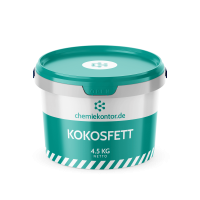Kokosfett kaufen – die häufigsten Fragen:
Bei chemiekontor.de wird Kokosfett in Behältern mit 4,5 kg, 18 kg, 25 kg und bei einem erhöhten Bedarf in einem Fass mit 180 kg angeboten.
Im Onlineshop von chemiekontor.de ist Kokosfett schon ab 5,13 € per kg erhältlich. (Ab-Preis bezieht sich auf den Kauf eines Fasses von 180 kg).
Kokosfett ist in Regel versandfertig auf Lager, die Lieferzeit beträgt 3 – 5 Werktage.
Kokosfett ist kein gefährlicher Stoff, weshalb es keine Sicherheitshinweise zu beachten gilt und keine Gefahrenkennzeichnung vorgeschrieben ist.
Die CAS-Nummer für Kokosfett lautet 8001-31-8.




